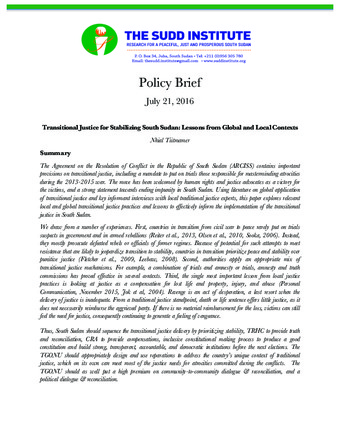Transitional Justice for Stabilizing South Sudan: Lessons from Global and Local Contexts
Publication Summary
The Agreement on the Resolution of Conflict in the Republic of South Sudan (ARCISS) contains important provisions on transitional justice, including a mandate to put on trials those responsible for masterminding atrocities during the 2013-2015 war. The move has been welcomed by human rights and justice advocates as a victory for the victims, and a strong statement towards ending impunity in South Sudan. Using literature on global application of transitional justice and key informant interviews with local traditional justice experts, this paper explores relevant local and global transitional justice practices and lessons to effectively inform the implementation of the transitional justice in South Sudan.
We draw from a number of experiences. First, countries in transition from civil war to peace rarely put on trials suspects in government and in armed rebellions (Reiter et al., 2013, Olsen et al., 2010, Sooka, 2006). Instead, they mostly prosecute defeated rebels or officials of former regimes. Because of potential for such attempts to meet resistance that are likely to jeopardize transition to stability, countries in transition prioritize peace and stability over punitive justice (Fletcher et al., 2009, Leebaw, 2008). Second, authorities apply an appropriate mix of transitional justice mechanisms. For example, a combination of trials and amnesty or trials, amnesty and truth commissions has proved effective in several contexts. Third, the single most important lesson from local justice practices is looking at justice as a compensation for lost life and property, injury, and abuse (Personal Communication, November 2015, Jok et al, 2004). Revenge is an act of desperation, a last resort when the delivery of justice is inadequate. From a traditional justice standpoint, death or life sentence offers little justice, as it does not necessarily reimburse the aggrieved party.If there is no material reimbursement for the loss, victims can still feel the need for justice, consequently continuing to generate a feeling of vengeance.
Thus, South Sudan should sequence the transitional justice delivery by prioritizing stability, TRHC to provide truth and reconciliation, CRA to provide compensations, inclusive constitutional making process to produce a good constitution and build strong, transparent, accountable, and democratic institutions before the next elections.The TGONU should appropriately design and use reparations to address the country’s unique context of traditional justice, which on its own can meet most of the justice needs for atrocities committed during the conflicts. The TGONU should as well put a high premium on community-to-community dialogue & reconciliation, and a political dialogue & reconciliation.
Nhial Tiitmamer has served as the Director of the Environment and Natural Resources Program at The Sudd Institute where he is currently on leave to work with United Nations in South Sudan (UNMISS). He has served as an Adjunct Assistant Professor at the University of Juba where he has taught Environmental Economics, Natural Resources Economics and Environmental Sociology. Between November 2021 and November 2022, Nhial worked as Senior Environment Associate with the United Nations High Commissioner for Refugees (UNHCR) in Juba. Before returning from Canada in 2013, Nhial worked at Arletta Environmental Consulting in Calgary and at University of Alberta’s Augustana Campus in Camrose in Alberta, Canada. Nhial’s research focusses on natural resources governance, environmental protection, climate change, and sustainable energy. He was awarded in May 2023 by the Board of Directors of The Sudd Institute with Research Impact Award for policy impacts. Nhial holds a B.A. in Environmental Studies with a minor in English Literature from the University of Alberta and an M.Sc. in Sustainable Energy Development from the University of Calgary in Alberta, Canada.

